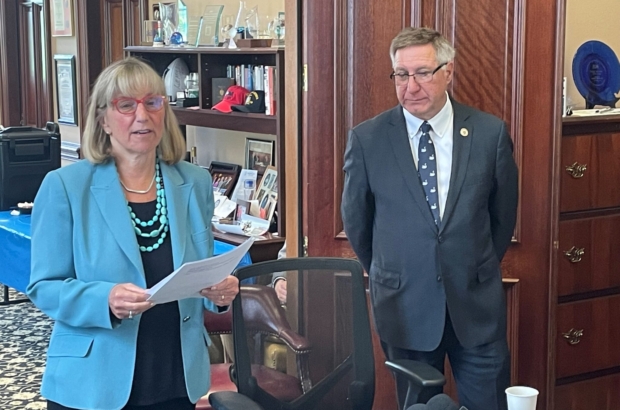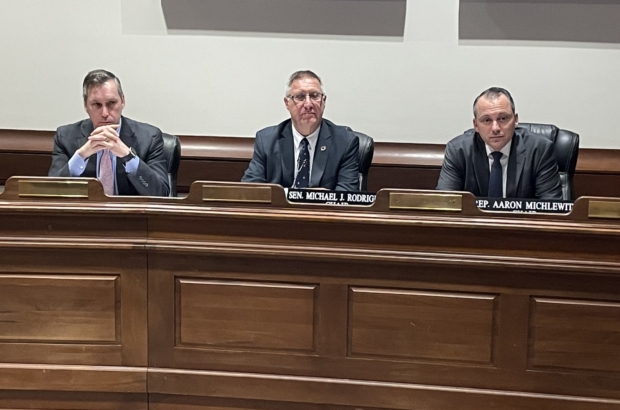The Massachusetts Legislature on Thursday passed legislation that protects open and public spaces throughout the Commonwealth and ensures their conservation for future generations. This legislation, known as the Public Land Preservation Act, permanently preserves and protects the amount of land designated as open spaces and prevents it from being used for other purposes.
“As we work to mitigate the effects of climate change we see and feel every day, it’s important that we do not allow the quality and acreage of open lands in Massachusetts to decrease,” said Senate President Karen E. Spilka (D-Ashland). “Open lands protect against floods, reduce heat from man-made roads and cities, increase carbon capture from plants and soils, protect our clean drinking water, and provide residents with wonderful outdoor recreational opportunities. I want to thank all the conferees, especially Senator DiDomenico for his leadership and Senator Eldridge for his years of attention and perseverance in seeing this legislation passed, as well as Senator Rodrigues for his review and support.”
“I am thrilled that we have reached an agreement on this bill which will protect our public land so our communities can have parks, green spaces, and clean water to enjoy throughout the Commonwealth,” said Senator Sal N. DiDomenico (D-Everett), Chair of the Senate Committee on Bills in the Third Reading. “Protecting our public lands is so critically important in our state because they also help protect our residents from the effects of climate change; our forests keep our air clean, our trees cool down our streets and communities, and our wetlands mitigate the effects of flooding and storms. I am grateful for Senate President Spilka’s dedication to getting this important bill passed, Senator Eldridge and Representative Balser for their years of work on this issue, and all the conference committee members for their help getting this bill over the finish line.”
“I am extremely proud that an agreement has been reached between the House and Senate on the landmark Public Land Preservation Act (PLPA), which will strengthen the state’s commitment to ensuring that there is no net loss of open space in the Commonwealth," said Senator Jamie Eldridge (D-Acton), Senate Chair of the Joint Committee on the Judiciary and the bill’s original sponsor. "I'm grateful to Senate President Spilka's commitment to passing this environmental legislation, the work of the conferees, and the persistent advocacy by conservation groups. I also want to acknowledge the godfather of PLPA, Phil Saunders, who dedicated his professional life to passing this bill.”
“With the passage of the Public Lands Preservation Act today, our public lands and open spaces will be preserved and protected for current and future generations to come,” said Senator Michael J. Rodrigues (D-Westport), Chair of the Senate Committee on Ways and Means. “Thank you to Senate President Spilka for her leadership and thank you to Senator Eldridge, Senator DiDomenico, and others for their leadership on this vital issue as well. Ensuring the preservation of our most important public lands, farms, recreational areas, drinking water supply lands, sensitive wildlife habitats, forests, and other conservation and open space lands is critical in our collective efforts to adapt to and confront climate change, while protecting the public health of our communities, and passage of this legislation is a testament to the Senate’s steadfast commitment to protecting our environment at all costs.”
Since its passage as a ballot initiative in 1972, Article 97 of the Massachusetts Constitution has recognized the importance of public lands. Lands acquired for conservation purposes under Article 97 have protected status, and such lands’ sale or conversion to other use must be approved by a two-thirds vote of each branch of the Legislature. Recognizing the importance of maintaining public lands, the Legislature, working with the Administration, has for many years ensured ‘no net loss’ of open spaces by requiring equivalent replacement land into open space when disposing of Article 97 land.
The conference report passed by the Legislature today codifies a ‘no net loss’ policy into law, making it legally binding. It ensures a public process takes place when a public entity considers disposing of Article 97 land and that replacement land is located nearby and of comparable acreage, fair market value, and natural resource value. The legislation includes a provision that allows for a cash payment in lieu of replacement land, provided that the payment amount is no less than 110 per cent of the value of the land and the money is used to purchase replacement land within three years.
Having passed the Senate and the House of Representatives, the bill now goes before the Governor for his consideration.
 |
| Legislature Passes Bill to Protect Open Spaces |










